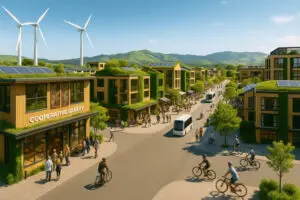Sustainable Social Economic Tech

Sustainable Social Economic Tech offer urban practitioners a framework that integrates economic activity although with social equity and ecological limits. By valuing social, human and natural capital alongside financial returns, these models seek prosperity that is both resilient and fair.
Historical foundations and equity-focused principles Sustainable Social Economic Tech
Early precedents show that profitability significantly, can coexist with broad social benefit. Tomáš Baťa’s 20th-century company towns in Zlín linked wages to housing, health care and education, demonstrating “capitalism with a conscience.” In Spain, the Mondragón cooperative network channels profits to worker-owners, while Eco villages such as Findhorn (Scotland) and Torfolk (Sweden) fuse green building, also local food and participatory governance. Common principles include:
- Community ownership of productive assets.
- Democratic decision-making to distribute surplus and risk.
- Stewardship of local resources to maintain long-term viability.
Current trends and measurable benefits
Recent although innovations (2024–2025) reinforce the model’s practicality:
- Community wealth building keeps institutional spending local; Preston (UK) tripled local procurement between 2013 and 2017, boosting employment.
- Localized economies generate higher multipliers—independent retailers reinvest ≈52 % of revenue locally versus 14 % for chains.
- Cooperatives and DeFi democratise capital; Québec hosts 3,300+ co-ops employing 116,000 people.
- Green micro-enterprises adopt circular practices, cutting waste and creating niche jobs.
The resulting impacts are well documented: localized supply chains improved pandemic resilience, and citizen-owned energy projects like Samsø (Denmark) achieved 100 % renewable while generating income for public services (State of Green). Economic resilience, green job creation and stronger social cohesion converge to improve public health and civic engagement (OECD policy brief).
Implementation challenges and enabling solutions Sustainable Social Economic Tech
Scaling remains difficult because policies favor conventional corporations, and small initiatives lack capital. However, four strategies are emerging:
- Supportive public policy—e.g. Scotland’s draft Community Wealth Building Act embeds social value in procurement.
- Public-private-community partnerships that co-design assets while preserving local stewardship.
- Capacity networks such as the Global Eco village Network for knowledge transfer.
- Innovative finance—municipal green bonds and community investment funds lower the cost of capital.
Next steps: Practitioners should map local anchor-institution spending, assess cooperative viability and incorporate circular design from project inception.
Technical

Short Long Term Profit Tech
Short Long Term Profit Tech describes the gap between rapid gains and durable value; closing that gap is central to sound policy, finance, and corporate strategy. Infrastructure: the cost of

Global Insights Green Tech
Global Insights Green Tech Infrastructure research reveals that urban sustainability advances fastest when cities treat climate solutions as shared intellectual capital rather than proprietary assets. The cross-regional exchange, for instance,

Education Strategies Tech
Education Strategies Tech in Sustainable Development Education strategies tech plays a central role in driving sustainable development in Australia. As communities face urgent climate and ecological challenges, educational efforts ensure